History
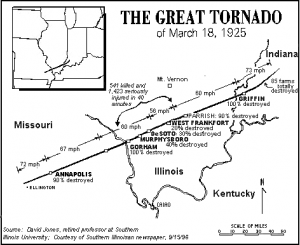 After writing about the worst winter ever, I began to look into other severe weather that made a big impact on a lot of lives, and might possibly have had an impact on my own family. I came across a tornado on this day, March 18, 1925 that was and still is the deadliest tornado in history. This tornado touched down at 1:00pm near Ellington, Missouri, and over the next 3 1/2 hours it tore across 3 states and 219 miles, finally ending up in Outsville, Indiana at 4:30 pm, where it hit one house and then dissipated. A tornado traveling this distance is virtually unheard of, but as we all know from this even…not impossible. This tornado was an F5 on the Fujita Scale. In all, the Tri-State Tornado, as it has since been called, hit more that 19 communities in Missouri, Illinois, and Indiana, while making an almost straight path across the 3 states.
After writing about the worst winter ever, I began to look into other severe weather that made a big impact on a lot of lives, and might possibly have had an impact on my own family. I came across a tornado on this day, March 18, 1925 that was and still is the deadliest tornado in history. This tornado touched down at 1:00pm near Ellington, Missouri, and over the next 3 1/2 hours it tore across 3 states and 219 miles, finally ending up in Outsville, Indiana at 4:30 pm, where it hit one house and then dissipated. A tornado traveling this distance is virtually unheard of, but as we all know from this even…not impossible. This tornado was an F5 on the Fujita Scale. In all, the Tri-State Tornado, as it has since been called, hit more that 19 communities in Missouri, Illinois, and Indiana, while making an almost straight path across the 3 states.
I don’t know if any of the 695 people who perished in the most deadly tornado in history, were related to me or not, but in studying my family history, I can say the I had family in those 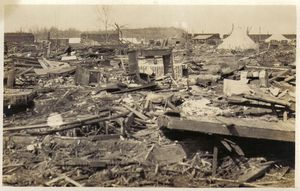 areas. In all likelihood, one or more of them were related, and when I think of the horror of their last moments, whether they were related or not…well, it is beyond horrible. In Missouri, 13 people lost their lives. In Illinois, 541 people lost their lives, with 234 in Murphysboro alone, which is a record for a single community, and there were 33 deaths at the De Soto school, which was a record for such a storm, and with only bombs and explosions taking higher school tolls. In Indiana 76 people lost their lives. The numbers are not exact. Some accounts say 630 and others say 689, while still others say 695. I find that in itself sad. It is always sad when lives lost go unaccounted for. In all, there were 2,027 injuries and 15,000 homes destroyed. I have been looking over the victims lists, and some of the last names are familiar to me, but I can’t say that these people were or were not related to me. Also, the lists that I found, were not complete lists. It may take a bit of
areas. In all likelihood, one or more of them were related, and when I think of the horror of their last moments, whether they were related or not…well, it is beyond horrible. In Missouri, 13 people lost their lives. In Illinois, 541 people lost their lives, with 234 in Murphysboro alone, which is a record for a single community, and there were 33 deaths at the De Soto school, which was a record for such a storm, and with only bombs and explosions taking higher school tolls. In Indiana 76 people lost their lives. The numbers are not exact. Some accounts say 630 and others say 689, while still others say 695. I find that in itself sad. It is always sad when lives lost go unaccounted for. In all, there were 2,027 injuries and 15,000 homes destroyed. I have been looking over the victims lists, and some of the last names are familiar to me, but I can’t say that these people were or were not related to me. Also, the lists that I found, were not complete lists. It may take a bit of 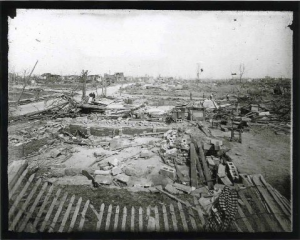 research to know for sure.
research to know for sure.
It doesn’t really matter whether I am related to any of the victims or not, the reality of this kind of devastation is beyond horrible. Of the 19+ communities, 5 were virtually destroyed along with more than 85 farms. I did find out that at the time of the Tri-State Tornado, my great great grandmother was living just 36 miles north of its path. One of the names might have been a cousin or nephew. Even knowing there is a possibility makes me sad. It is very hard to think about the family members of the victims who are left behind.
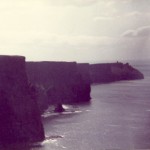 We all have within our DNA, a mix of nationalities, and with that, I think most of us have a little Irish in the mix. I know that in my own roots, you would find Irish ancestors from both sides, and I’m pretty sure Bob’s family is the same. A short time after my grandfather passed away, my grandfather and her sisters and brothers had the opportunity to travel back to Ireland to see the old country and meet some of the family from Ireland. It would be a trip she would remember for the rest of her life. She got to see the castles, kiss the Blarney Stone, and see the green, green hillsides. She got to see where all tradition started. I wish I could have gone along with her. What a trip that would have been.
We all have within our DNA, a mix of nationalities, and with that, I think most of us have a little Irish in the mix. I know that in my own roots, you would find Irish ancestors from both sides, and I’m pretty sure Bob’s family is the same. A short time after my grandfather passed away, my grandfather and her sisters and brothers had the opportunity to travel back to Ireland to see the old country and meet some of the family from Ireland. It would be a trip she would remember for the rest of her life. She got to see the castles, kiss the Blarney Stone, and see the green, green hillsides. She got to see where all tradition started. I wish I could have gone along with her. What a trip that would have been.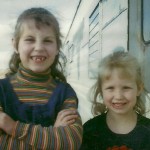
While I have never been to Ireland, I do have something in my own life that in name only gets its roots from Ireland…Irish Twins. What, you might ask are Irish Twins? Irish Twins are siblings born either in the same year or within 12 months of each other. My daughters, Corrie and Amy were born 11 months apart. My guess is that you know some of these yourself. I know that I have cousins who are also Irish Twins. In fact, my cousins. Susie and George are Irish Twins. While Irish Twins may not have any real ties to Ireland, it is something that I think is very cool.
So, today we celebrate that bit o’ the old country that most likely resides in each of us. Whether you  party at the pub, drinking green beer, or make sure that you are wearing something green, so as not to be pinched, most of us will celebrate the day in one way or another. It’s not that it is what we would consider a big holiday, but rather a fun holiday…one for goofiness, partying, and as my younger Irish Twin would say, a day to “Kiss me…I’m Irish.” It began however as a Christian holiday. It is also an Irish holiday. So how are the two related? Well, St Patrick’s Day was the day that Christianity came to Ireland…so maybe it should be a bigger holiday that we have made it. So, however you choose to celebrate it, I just want to tell everyone Happy St Patrick’s Day!!
party at the pub, drinking green beer, or make sure that you are wearing something green, so as not to be pinched, most of us will celebrate the day in one way or another. It’s not that it is what we would consider a big holiday, but rather a fun holiday…one for goofiness, partying, and as my younger Irish Twin would say, a day to “Kiss me…I’m Irish.” It began however as a Christian holiday. It is also an Irish holiday. So how are the two related? Well, St Patrick’s Day was the day that Christianity came to Ireland…so maybe it should be a bigger holiday that we have made it. So, however you choose to celebrate it, I just want to tell everyone Happy St Patrick’s Day!!
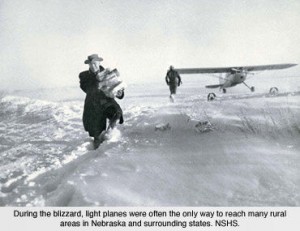
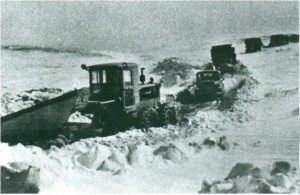 A few days ago, my father-in-law received a phone message from an old family friend. She was calling to wish my mother-in-law a belated happy birthday, and to ask my father-in-law what he remembered about the 1949 blizzard in reference to Colstrip, Montana. Since my father-in-law was in the hospital at the time, I called her back and told her that I would have him call her. Meanwhile, my own interest was peaked about this blizzard, of which I had been totally unaware prior to this call. I got on the Internet and did some searching of my own, and I was quite surprised at what I found.
A few days ago, my father-in-law received a phone message from an old family friend. She was calling to wish my mother-in-law a belated happy birthday, and to ask my father-in-law what he remembered about the 1949 blizzard in reference to Colstrip, Montana. Since my father-in-law was in the hospital at the time, I called her back and told her that I would have him call her. Meanwhile, my own interest was peaked about this blizzard, of which I had been totally unaware prior to this call. I got on the Internet and did some searching of my own, and I was quite surprised at what I found.
The 1949 blizzard began on January 2, 1949, and it was soon to be called the “worst winter ever” by anyone who had the misfortune to go through it. The storm roared across several states, and was actually a series of storms that raged on until February 22, and dumped between 50 and 60 inches of snow, depending on where you were. It put a whole lot of people, especially farmers and ranchers in dire straits. Before long everyone knew that something was going to have to be done. Emergency flights of supplies began bringing everything from food to hay to the desperate people in the area. Snow plows pushed through in an effort to get truckloads of hay into the ranchers. Still, it would not be enough to stop the massive loss of livestock that the coming spring would reveal, not to mention the 235 people across several states who lost their lives. My father-in-law told me that the cows tried to stay above the snow by walking on it as it fell. When the snow got very deep, the cows ended up walking above the trees. Then the weight of their bodies caused them to fall through the snow and into the tree tops, where the were trapped and died of starvation. Some ranchers lost entire herds of cattle, either to falling through the tree tops, or being buried alive. My father-in-law told me that the spring brought a horrible sight. Dead cattle hanging in the trees…everywhere.
Transportation came to a standstill too. Before long trains were unable to move forward, and became buried in the snow, right where they stood. When the tracks were finally cleared, the snow would stand as much as 18 feet high beside them. I’m quite sure it was an eerie sight when the trains finally began to move again, because the piled snow was much higher than the trains, and so prevented any view from the train. Not that it mattered much, because there was nothing but snow to see anyway. I can imagine that if a person was at all claustrophobic, however, the feeling that they would encounter going down that track would be almost more than they could bear.
The spring of 1949, would bring to an end, “worst winter ever” and the beginning of healing for many people. 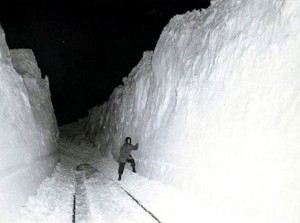
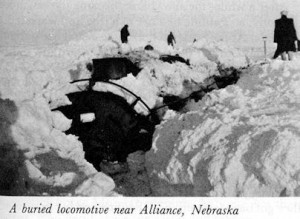 Ranchers would have to begin again. Their herds would have to be rebuilt, and it would take much time and a lot of work. I can imagine that the flooding from all that snow was devastating too. Still, healing would take place too. That spring was also one of beginnings, such as the beginning that is so special to my father-in-law, because on June 6, 1949 he would marry the love of his life, my mother-in-law, and so began their years of marriage…63 years and counting.
Ranchers would have to begin again. Their herds would have to be rebuilt, and it would take much time and a lot of work. I can imagine that the flooding from all that snow was devastating too. Still, healing would take place too. That spring was also one of beginnings, such as the beginning that is so special to my father-in-law, because on June 6, 1949 he would marry the love of his life, my mother-in-law, and so began their years of marriage…63 years and counting.
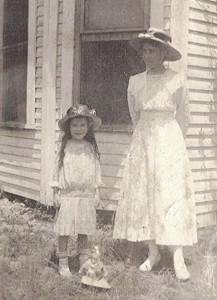 My Aunt Laura was born 10 years before the rest of her siblings, and so was an only child for those 10 years. I have often wondered about the historical changes that took place during those 10 years. She was born just a 4 months after the RMS Titanic sunk, and the world was still reeling from the devastating loss of life, and trying to figure out how to make sure such a tragedy never happened again. Travel by ship has changed immensely since that time, and a lot by 1922, when my Uncle Bill was born. No, that doesn’t mean that there are no ship wrecks, and that lives lost at sea have been reduced to zero, but the people on ships have a better chance of surviving, simply because the radios are never turned off. They are manned 24 hours a day, so that emergency calls can go out and be received. Had that been the case in 1912, the 1,502 lives lost might have been saved. No one was killed in the initial collision. A radio call could have changed everything, but the nearest ship…the SS Californian never heard the distress call, because the radio had been turned off for the night. The inadequate number of lifeboats on the RMS Titanic would have been enough to ferry all the passengers to safety, had the SS Californian heard the call. That loss changed much about ocean travel, and those changes took place during those 10 years when my Aunt Laura was an only child, and her younger siblings would not know a time without those safety regulations in place…not that they would affect them any.
My Aunt Laura was born 10 years before the rest of her siblings, and so was an only child for those 10 years. I have often wondered about the historical changes that took place during those 10 years. She was born just a 4 months after the RMS Titanic sunk, and the world was still reeling from the devastating loss of life, and trying to figure out how to make sure such a tragedy never happened again. Travel by ship has changed immensely since that time, and a lot by 1922, when my Uncle Bill was born. No, that doesn’t mean that there are no ship wrecks, and that lives lost at sea have been reduced to zero, but the people on ships have a better chance of surviving, simply because the radios are never turned off. They are manned 24 hours a day, so that emergency calls can go out and be received. Had that been the case in 1912, the 1,502 lives lost might have been saved. No one was killed in the initial collision. A radio call could have changed everything, but the nearest ship…the SS Californian never heard the distress call, because the radio had been turned off for the night. The inadequate number of lifeboats on the RMS Titanic would have been enough to ferry all the passengers to safety, had the SS Californian heard the call. That loss changed much about ocean travel, and those changes took place during those 10 years when my Aunt Laura was an only child, and her younger siblings would not know a time without those safety regulations in place…not that they would affect them any.
In early 1912, just months before my Aunt Laura turned 2, New Mexico became the 47th state, on January 6, 1912, and Arizona became the 48th state, on February 14, 1912. Our nation would continue to have only 48 states until 1959, when on January 3rd, Alaska, and on August 21, Hawaii joined the Union. Aunt Laura probably didn’t remember a time when there were only 46 states, much like I, at 2 and then 3, don’t remember having only 48 states, but nevertheless, history tells us that we lived in a time when that was so. Aunt Laura’s siblings, like my own little sisters, except Caryl who lived when there were only 49 states for a few months, since she was 4 months old when Alaska became a state, lived in a time when there were more states than when their older siblings were born.
Just one week before my Aunt Laura’s 4th birthday, the United States would be drawn into World War I. The beginning of the war was probably something that didn’t make much difference to her, but by it’s official end, on November 11, 1918, she was old enough to know what it was all about, and may have even known someone who lost a loved one in the fighting. World War I was just another piece of history by the time my aunt’s younger siblings were born, and I’m sure hearing about it through the years had little effect on them, unlike their 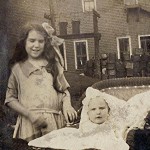 older sister. World War II would be a very different matter for the younger siblings, as they would all be involved in that war in one way or another.
older sister. World War II would be a very different matter for the younger siblings, as they would all be involved in that war in one way or another.
There were many things that my Aunt Laura experienced, that her younger siblings did not. Much of it was without her having any real knowledge of it, but looking back, she would always know it was so. Just like I find it very odd to know that during my lifetime, ships have sunk, wars have been fought, and states have been added to make us the 50 United States that we know today, I’m sure she sometimes marveled at the difference ten years can make.
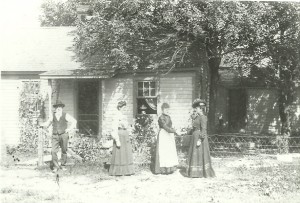 During the Civil War, when so many of the young men were away fighting, the War Department made a call “to the Union-loving women of America on behalf of those noble fellows who have dedicated themselves to their country.” Many of the nation’s women quickly responded to the call, and the Ladies Aide Society was born. They held fund raising luncheons and suppers, where they accepted cash donations to purchase supplies for the hospitals where the soldiers were being treated. War wounds were only a part of the causes of death from the battles, in fact more than half of the men who died, were taken down by germs and unsanitary conditions. The efforts of the amazing women of the Ladies Aide Societies went a long way toward saving men who might otherwise have died.
During the Civil War, when so many of the young men were away fighting, the War Department made a call “to the Union-loving women of America on behalf of those noble fellows who have dedicated themselves to their country.” Many of the nation’s women quickly responded to the call, and the Ladies Aide Society was born. They held fund raising luncheons and suppers, where they accepted cash donations to purchase supplies for the hospitals where the soldiers were being treated. War wounds were only a part of the causes of death from the battles, in fact more than half of the men who died, were taken down by germs and unsanitary conditions. The efforts of the amazing women of the Ladies Aide Societies went a long way toward saving men who might otherwise have died.
Women had always been considered too weak and delicate to be exposed to the horrors of war, yet, they provided much of the supplies that gave the hospitals the ability to use fresh sanitary bandages and such to treat the men. Many of the women were not content to merely pine away for their men, fighting in the war, they wanted to do something to help out. Their contributions of supplies, food, clean clothes and nursing services fought disease. Something as simple as a new blanket sent from home could replace one that was infested with disease, possibly saving a life. Little did these women, or anyone else for that matter, know how important their efforts would be. What started with a few women, meeting in someone’s home trying to do something for their loved ones, grew into a nationwide effort, and in the end, no one doubted the ability of these women, who were thought to be far too delicate to see some of the things they saw.
Many young men didn’t come home from the war, because of the horrible injuries and the horrible conditions, but there were a lot more that came home than because of the efforts of these brave women who gave of themselves to make the conditions better for these soldiers. I seriously doubt if women were thought of as too delicate again after they showed just how strong they were in the Ladies Aide Societies of this nation.
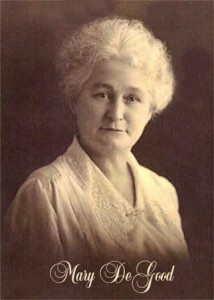 Since the beginning of this country, its citizens have been moving. We are a nation of pioneers. We came from many other countries to start a new life in a new land, and we seldom settle down in the place where we started, although, some do. Some of the pioneers in this country seemed, almost out of place in their new surroundings. When I look at pictures of some of my family’s ancestors, such as Mary DeGood, my husband’s great great grandmother, I see a woman, who had the innocence of many people had who started out life in the eastern part of our country, and later a strength that comes from living in the west. Many pioneer women seemed to take on the roughness of the west when they moved in the mid to late 1800’s, and there is nothing
Since the beginning of this country, its citizens have been moving. We are a nation of pioneers. We came from many other countries to start a new life in a new land, and we seldom settle down in the place where we started, although, some do. Some of the pioneers in this country seemed, almost out of place in their new surroundings. When I look at pictures of some of my family’s ancestors, such as Mary DeGood, my husband’s great great grandmother, I see a woman, who had the innocence of many people had who started out life in the eastern part of our country, and later a strength that comes from living in the west. Many pioneer women seemed to take on the roughness of the west when they moved in the mid to late 1800’s, and there is nothing 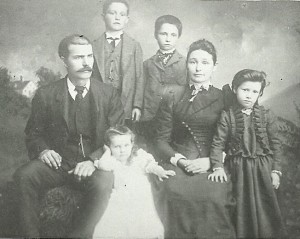 wrong with that, because it took a tough woman to make it in the west, just like it took tough men to make it in the west. Many of the people who came out west, couldn’t make it. They didn’t have the strength of character, or the physical stamina to handle this rugged country. Those who weren’t tough enough, went back home.
wrong with that, because it took a tough woman to make it in the west, just like it took tough men to make it in the west. Many of the people who came out west, couldn’t make it. They didn’t have the strength of character, or the physical stamina to handle this rugged country. Those who weren’t tough enough, went back home.
Bob’s great great grandmother had those qualities, and many people seemed to realize it, because she was well known and respected in the town of Prosser, Washington. It isn’t often that a woman is considered a pioneer in a community, but she was. Mostly, it is the men we think of when we think of pioneers, but 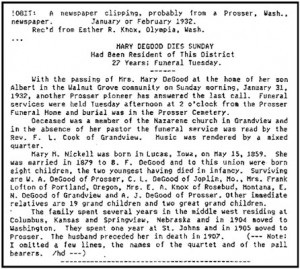 where would those men have been without their wives. While they probably wouldn’t admit it to their wives and families. They were the main reason men headed out west…to find a better life for them and their families.
where would those men have been without their wives. While they probably wouldn’t admit it to their wives and families. They were the main reason men headed out west…to find a better life for them and their families.
Still, it was a rare man who really made a good life in the west alone. They may have started out alone, but before long they knew they didn’t want to go on alone. That was a wise man for sure. Bob’s great great grandparents married and soon headed out west, finally settling in Prosser,Washington. The people of Prosser considered them to be pioneers of their town. They were respected and revered, and upon their passing, they were given a pioneer’s send off. A pioneer’s last call.
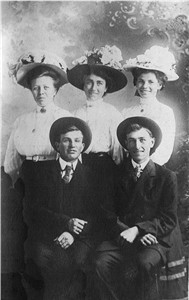 When Prince William married Kate Middleton, the world became enthralled with the hats that were being worn by the elite female guests. It was as if the hat was the only part of the outfit that mattered. I watched when Prince Charles married my distant cousin, Diana Spencer, but I don’t recall so much fuss over the hats the women wore. Maybe there was a big fuss, but it just wasn’t what stuck in my mind. This time, however, the hats were the most important part of the pre-ceremony coverage. I was never one to wear hats much, in fact pretty much never by choice, so I couldn’t see the draw they seemed to have on the people in England. I suppose if I lived in England, I might think differently, and I also suppose that some of my English relatives would think I was a bit on the rogue side, for not conforming to the style.
When Prince William married Kate Middleton, the world became enthralled with the hats that were being worn by the elite female guests. It was as if the hat was the only part of the outfit that mattered. I watched when Prince Charles married my distant cousin, Diana Spencer, but I don’t recall so much fuss over the hats the women wore. Maybe there was a big fuss, but it just wasn’t what stuck in my mind. This time, however, the hats were the most important part of the pre-ceremony coverage. I was never one to wear hats much, in fact pretty much never by choice, so I couldn’t see the draw they seemed to have on the people in England. I suppose if I lived in England, I might think differently, and I also suppose that some of my English relatives would think I was a bit on the rogue side, for not conforming to the style.
I would also suppose that my grandmother, on my dad’s side, might be inclined to agree with them, if she were still alive, because she came from the era that had American women dressing somewhat similar to the English women…right down to the hats. When I look and those hats, all I can think, is how in the world do they keep their heads from flopping over from the weight of the hat. Now, I know that some of the hats were very light weight, even though they were big, but there were still those hats that weighed quite a lot. And the styles…well, wow!! Some of those women carried half a garden’s worth of flowers on their heads. They adorned them with peacock feathers, fake birds, ribbons, and many other such items. You could tell a woman’s social status by the hats they wore. And both the men and the women looked at the hats the women wore, although the men probably looked at the hats less that the other women at the event.
It’s not that I don’t like the look of a fancy hat on a woman, and in fact, I think many are just beautiful. I just wouldn’t want to have to wear one of them, myself. However, on my grandmother, those hats had a way of looking stunning. I have always thought my grandmother was beautiful, and so petite. She had an elegance about her that made you stop and take a second look.You just knew that she and her sisters were women of class and style. They knew what was the latest style, and they knew how to look elegant in those styles. They wore stylish dresses, carried parasols, and oh, those hats.
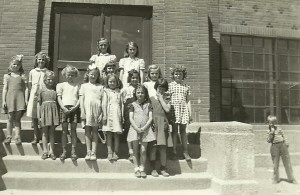 Little boys are all pretty much the same. They are curious. They want to know about everything that is going on around them. I can’t say that I blame them. There are a lot of interesting things to see, do, and learn about, in this world. Now I’m not saying that girls aren’t curious, and this story could just as easily have been written about little girls, but today’s story is about boys…and one in particular.
Little boys are all pretty much the same. They are curious. They want to know about everything that is going on around them. I can’t say that I blame them. There are a lot of interesting things to see, do, and learn about, in this world. Now I’m not saying that girls aren’t curious, and this story could just as easily have been written about little girls, but today’s story is about boys…and one in particular.
When my mom was a little girl, school pictures were done differently than they are today, and even differently than when I was a little girl. I don’t know if they took any individual pictures, but so far, I haven’t come across any. The pictures were taken by class. While I have seen some with the whole class together, I have also seen some with just the girls and just the boys. That is something that wasn’t done when I was a little girl, and indeed later on, the class picture was just a grouping of the individual pictures, placed together on a 5 x 7 picture.
The funny thing about the curiosity of little boys is that there always seems to be one who is a bit of a lady’s man, and just loves hanging out with the girls. That same little boy probably wants to be right in the middle of everything. That little boy will somehow insert himself into situations where he just doesn’t belong, such as this little boy, who managed to be at the edge of, and leaning into the picture of the girls…just close enough to get into the picture. The cameras of yesteryear were unable to view the picture, and therefore, you really didn’t know what you had until the film was developed. The photographer probably never saw this little boy leaning into the picture until the film was developed, and they were stuck with it, because it cost more to retake.
Now, it is possible that the photographer, the teacher, and maybe even the parents were upset with this turn of events, but I, personally, find it very cute. I picture this little boy as the one who loved little girls a lot, and didn’t really care if anyone knew it. He was curious about them, and wanted to know all about them. He might have even had a girlfriend in that group…or maybe several. That is how a lady’s man is. Try as he might, he doesn’t just stick with one girl…at least until he finds that one girl who changes everything, and removes his lady’s man status. Until that day comes, he goes from girlfriend to girlfriend, and might even have more than one at a time. Whatever the case may be, I think that there is always one little boy like that in every class, and sometimes there are several. That is just the way little boys are.
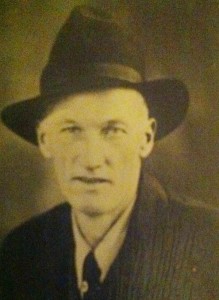 Bob’s great grandfather was a single dad for much of his children’s young lives. He worked on the Northern Pacific Railroad as a yard clerk. It was a time in their lives when everyone had to pitch in. The kids, Bob’s grandmother, Vina, and her brother, Kirby had to get things done around the house, because their dad worked long hours at work. Those were different times. Kids at home doing their chores were much safer than they were in this day and age. The two of them knew that they needed to get the house cleaned and supper on the table by the time their dad got home…not because they were afraid of him…because they knew how tired he would be. Grandma spoke so highly of her dad, that I know she felt nothing but love and respect for him.
Bob’s great grandfather was a single dad for much of his children’s young lives. He worked on the Northern Pacific Railroad as a yard clerk. It was a time in their lives when everyone had to pitch in. The kids, Bob’s grandmother, Vina, and her brother, Kirby had to get things done around the house, because their dad worked long hours at work. Those were different times. Kids at home doing their chores were much safer than they were in this day and age. The two of them knew that they needed to get the house cleaned and supper on the table by the time their dad got home…not because they were afraid of him…because they knew how tired he would be. Grandma spoke so highly of her dad, that I know she felt nothing but love and respect for him.
His occupation was a hard one, but it had its perks too. When his vacation time came around, their travel plans often included a train ride to somewhere. I can imagine how much fun that must have been. Not many kids in those days got to do a lot of traveling, and unless your dad worked on the railroad, or you had a lot of money, you probably didn’t get to ride on a train much either. I don’t know where all they got to go, but since I like riding trains myself, I can totally picture how excited they must have been every time they set out on a new adventure. I can imagine trips back east to visit family members who might have lived back there, or down south, maybe to see the Gulf of Mexico. So many places they might have gone…so many things they might have seen.
I have ridden a train for short distances, but never on a long trip. I can tell you that it is an exciting ride, and one I never get tired of, so I expect that Grandma and Kirby were thrilled every time they got on board. I think it would be so exciting to eat and sleep on the train…especially as young children, who already see life as one big adventure.
I wish I had been able to meet Great Grandpa Leary, but he was gone six years before I was born, and of course, years before I became a part of the family by marrying Bob, and so much too late to meet this man whose daughter always spoke so highly of him. I think he must have been quite a guy.
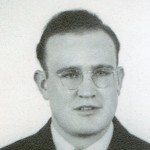
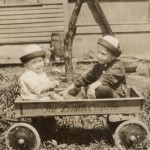 My Uncle Bill is the 2nd child of my dad’s parents, and at 91, he is the one who has lived the longest. He is the last one left. That is something that I find to be sad for those of us who have lost our parent from the Spencer side, and happy that Uncle Bill is still with us. Reaching the age of 90 was something Uncle Bill never expected, and now, he has gone beyond that, and as far as we know, he will still be here next year and the year after that. And that does make me glad, because I love him very much and really don’t want him to leave us yet. I’m happy that God has blessed him with long life.
My Uncle Bill is the 2nd child of my dad’s parents, and at 91, he is the one who has lived the longest. He is the last one left. That is something that I find to be sad for those of us who have lost our parent from the Spencer side, and happy that Uncle Bill is still with us. Reaching the age of 90 was something Uncle Bill never expected, and now, he has gone beyond that, and as far as we know, he will still be here next year and the year after that. And that does make me glad, because I love him very much and really don’t want him to leave us yet. I’m happy that God has blessed him with long life.
His health is good, but I suspect he has forgotten more about the family history than most of us will ever know. Uncle Bill became interested in the family history as a young man, and he has kept extensive records. The records he has are more than remarkable, because it was mostly done without the help of computers. He received some help later in life that involved computers, but his research was not done that way. I have also done a lot of research on my family tree, and it was Uncle Bill who inspired me to do so. I must say, however, that I did use the computer a lot, so my research has come from the work of many other people too. Not as remarkable as Uncle Bill’s work, but effective just the same.
Uncle Bill’s life was based in many ways on his childhood experiences. From his love of guns and antiques, to his management skills, he watched those people he respected and sometimes even took on the same causes, as is the case with the aunt who got him started in genealogy. The guns came from his personal experience, and his love of antiques was what got his longest career going. He collected everything… guns, coins, stamps, and antique furniture. Then he decided to start a shop to buy, sell and trade those items. His shop was an amazing place, because you never knew what treasures were hidden there. Eventually, he started a mail order business, and sold his items all over 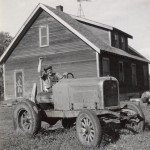
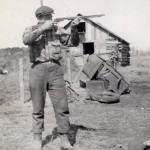 the country, and probably the world.
the country, and probably the world.
Today is Uncle Bill’s 91st birthday, and I’m sure that if he were not retired, you would still find him working at his shop in Superior, Wisconsin, doing his very best to make that next sale, or sitting with one of the people that used to stop by just to visit, and talk about old times. Happy birthday Uncle Bill!! We love you very much and hope you have a wonderful day!!

